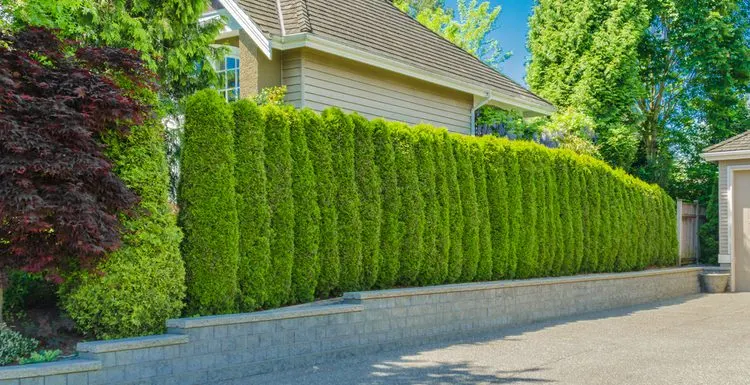When you add plants to your yard, it gives your home more curb appeal and makes your yard feel more peaceful.
But trees, shrubs, and other plants can be used for more than just decorating your yard or landscaping. Everyone deserves privacy.
If your home is too close to your neighbors or people are looking into your yard, adding privacy plants is a great way to give you some much-needed privacy.
Not to mention that they look fantastic.
What Plants are Great for Privacy?
For some people, adding a fence is the best and easiest option for adding some privacy to their yard. Unfortunately, adding a fence isn’t always a possibility.
Whether it’s because of property lines, homeowner associations, or simply because you can’t find a fence you like, privacy plants are an excellent option.
Privacy plants can be trees, vines, or shrubs, and they can act as a natural fence or pair well with a fence already in place.
If you’ve been searching for privacy plants, you’ve probably discovered there are hundreds to choose from.
They come in all shapes and sizes and provide a different level of privacy. So, how do you know which one or ones to choose?
10 of the Best Privacy Plants
With so many options available to you, it can be challenging to know which plants are best for you. Take a look at some of the top choices for privacy plants.
1. Arborvitae
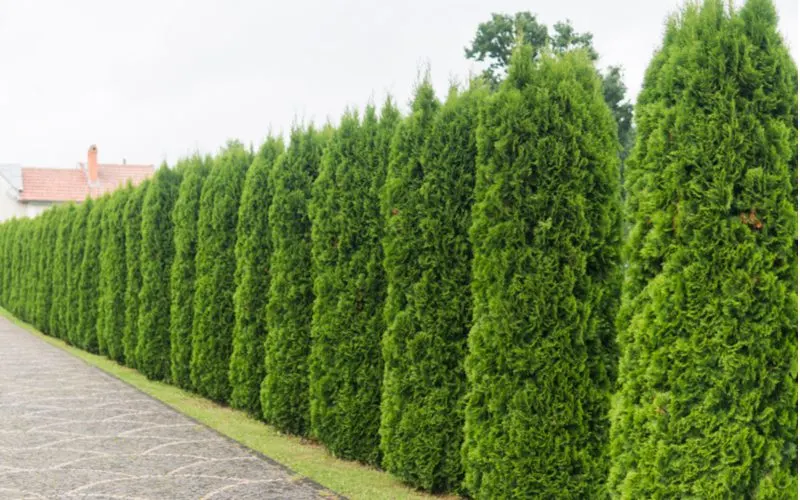
Volodymyr_Shtun/Shutterstock
Whether you’ve realized arborvitae is a privacy plant or not, you’ve likely seen these luscious trees before. Emerald Green arborvitae are by far the most common privacy plants.
The main reason arborvitae trees are so popular is that they are a great plant that can live in almost all climates.
Most plants don’t do well in extreme heat and cold, arborvitae included, but these plants can thrive in nearly all corners of the United States.
Arborvitae trees are broad trees that can grow relatively tall, depending on the type of arborvitae you purchase. You can buy stature arborvitae, dwarf, or giant, depending on the height you’re looking for.
Some can reach heights of 12 to 15 feet. Since they can grow wide, placing them close together can create a natural barrier without installing a fence.
These are great for creating a natural fence when your home and your neighbors are very close together.
2. Fan Palm

Sabeeq Palayil/Shutterstock
If you live in the south or are looking for a more tropical aesthetic for your yard, fan palms are a great option for privacy.
These plants are sturdy, and the thick and wide leaves give you some much-deserved privacy.
The leaves on a fan palm can spread out to as much as three feet, allowing you to plant them further away from one another while still having a solid amount of privacy.
Fan palms can grow up to 15 feet, but pruning them will allow the plant to act more like a shrub than a tree.
3. Bamboo

Enciktat/Shutterstock
Bamboo is one of the fastest-growing privacy plants. So, if you want privacy quickly, bamboo may be for you, specifically clumping bamboo.
As this plant grows, the dense stems being close together make it harder to see into your yard.
This plant can grow in many environments, but desert climates may not be the best for it. You need to water bamboo often to keep it growing, making it harder to thrive in desert environments.
Unless you plan on watering your bamboo more than the average person, the desert isn’t a great idea.
One thing to keep in mind when planting bamboo in your yard is that it can become invasive. The best way to prevent this from happening is to plant it in planters instead of directly in the ground.
4. Boxwood

Beekeepx/Shutterstock
If you’re searching for privacy plants that literally look like a fence, boxwood is the plant for you. Boxwood mimics a fence, making it one of the most desired privacy plants.
There are several types of boxwood, but if you live in an area where deer are present, almost all boxwood is deer-resistant.
While boxwood can take longer to grow to the height you want, it’s effortless to maintain once it grows higher. You can shape boxwood however you wish because pruning is simple.
Boxwood thrives in cooler climates where it rains regularly. But it can also thrive in warmer temperatures as long as they get plenty of water.
5. Chocolate Vines
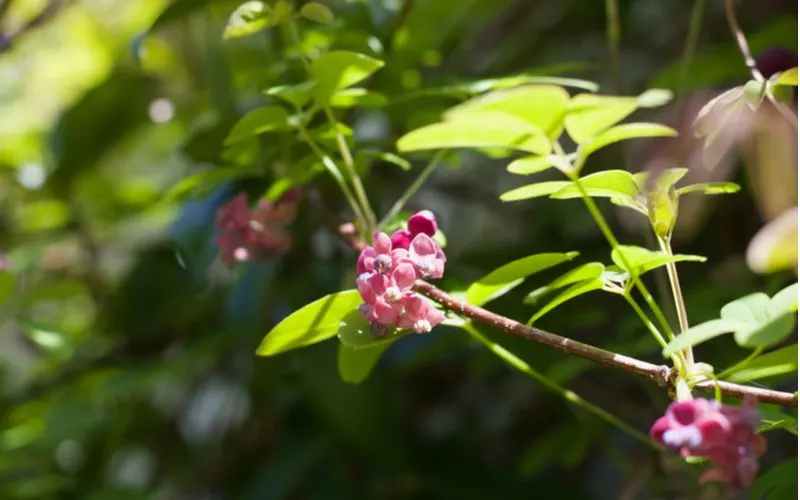
Jananz/Shutterstock
Privacy plants aren’t always super-dense plants. Vines are great to provide minimal privacy or use in addition to other privacy plants. Chocolate vines are beautiful plants that grow deep purple flowers on vines.
Chocolate vines look stunning on fences to add a touch of greenery or on their own. This plant is native to North and South Korea and Japan, but it grows well in North America.
They can grow in most areas of the United States, but if you live in a warmer climate, the vines may stay green almost all year.
6. Red Twig Dogwood
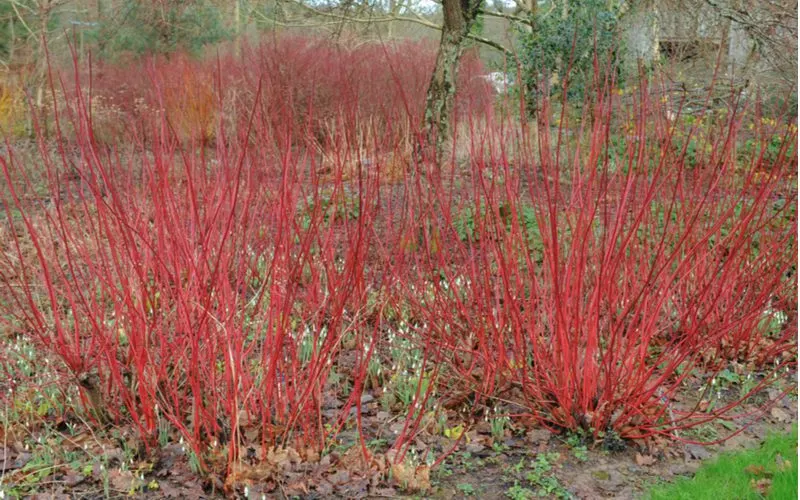
Peter Turner Photography/Shutterstock
Many people use red twig dogwood as a privacy plant in the northern part of the United States. Red twig dogwood is one of many plants that lose their leaves in the autumn.
During spring and summer, you’ll have a shrub with full foliage, and then when fall approaches and red twig dogwood begins to lose its leaves, you’ll be left with beautiful red branches.
It does well in extreme temperatures, unlike many other plants. This shrub can grow ten feet wide, giving you a lot of privacy with fewer plants. Plus, they can grow to eight feet high, but you can always trim them to keep them shorter.
7. Privet Trees
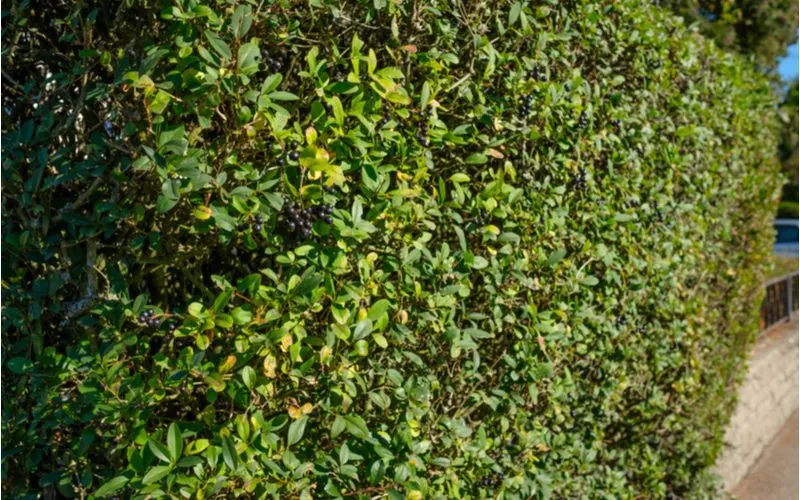
Bernd Schmidt/Shutterstock
Privet trees are ideal for increasing not only your privacy but also your home’s curb appeal. These trees grow quickly, making them a popular choice for those looking to improve their privacy fast.
While this plant is a tree, it can also be used as a hedge if you prefer that. Keep in mind that while privet trees as hedges are stunning, they require much more maintenance than if you were to let the plant grow as a tree.
When you take proper care of privet trees, they can grow between two and three feet per year. During the spring, you’ll have lovely-smelling flowers blooming on the tree.
They’re great for creating a wall of greenery to shield you from anyone passing by.
8. Skip Laurel
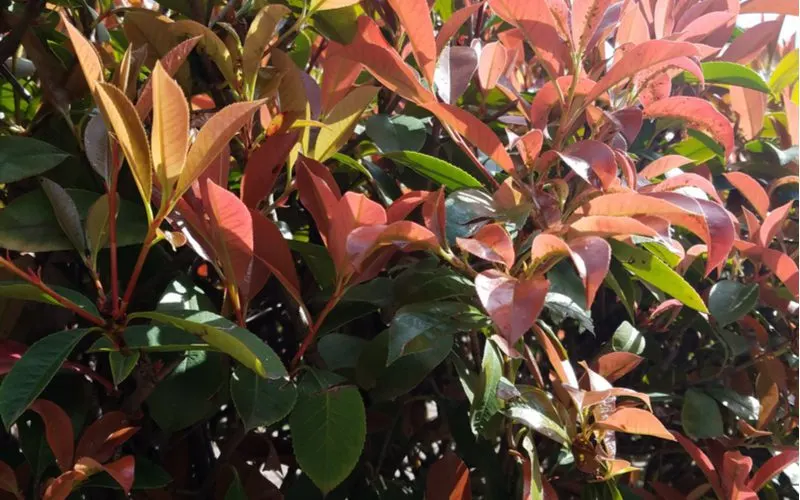
SMJazz/Shutterstock
Many privacy plants are relatively low-maintenance, but skip laurels make a great addition to your garden if you love gardening. These plants require more effort than other privacy plants, but they’re well worth it.
Skip laurels provide your yard with stunning evergreen foliage and can grow to be ten feet tall. This tall and thick tree creates the perfect natural privacy fence.
These plants require annual pruning, but you’ll have beautiful white flowers blooming on the branches in the spring.
9. Clematis
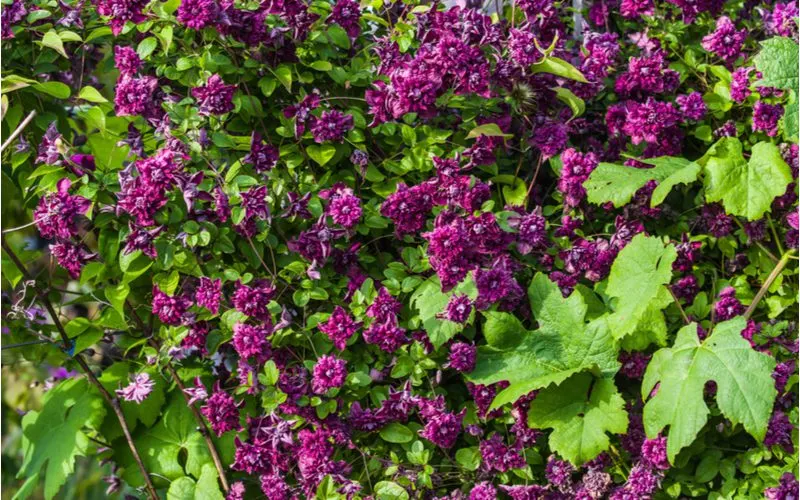
Sirle Kabanen/Shutterstock
Vines are perfect for privacy. Clematis is a large vine that produces beautiful flowers in different colors. Some flowers will be yellow, dark red, purple, white, or lavender.
Clematis isn’t a fast-growing plant and can take several years before it matures and begins growing flowers.
If you are more of an instant gratification person, you can purchase clematis vines that are at least two years old. As with most vines, clematis is a climbing plant.
If you’re considering adding clematis vines to your yard, you’ll need to make sure it has something to latch onto to make sure it doesn’t stop growing. You can place it near a fence or any other structure.
10. Euonymus
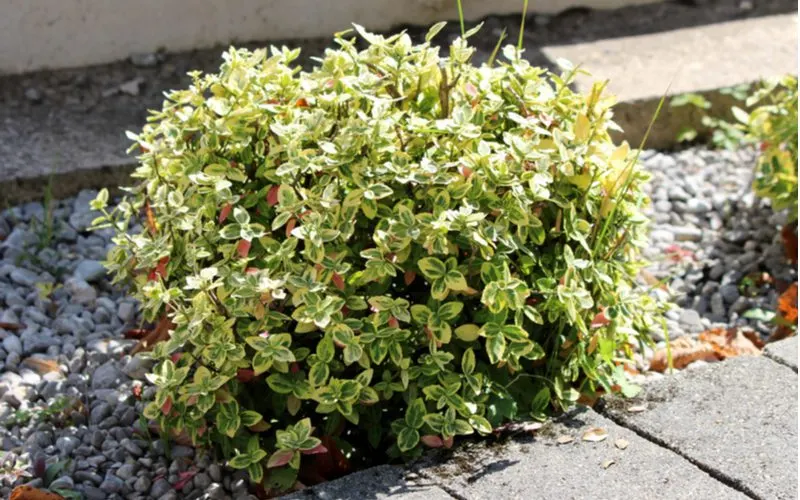
Hecos/Shutterstock
Euonymus is another quick-growing privacy plant. As Euonymus grows, it will fill out and provide you with some much-needed privacy.
It will grow to be about four feet high, and since it grows neatly, the amount you’ll need to prune the plant is minimal.
Euonymus is a versatile plant. They can act as a short tree or hedge, depending on how you shape them. If you want this plant to act more like a hedge, planting several close together is the way to go.
It’s a great plant because it can tolerate almost all weather without wilting. During the spring and summer, it’ll have beautiful flowers sprouting all over the plant.
Frequently Asked Questions
If you have questions about privacy plants, we’ve answered the top two questions here.
How Much Do Privacy Plants Cost?
The simple answer is that it depends. Some plants cost more than others, and the total cost will depend on how many of the plants you're buying.
You can buy some plants as low as $30, while other plants may cost close to $100 for one plant. If you're planning to hire someone to plant them for you, that adds additional cost.
Are Privacy Plants High-Maintenance?
Generally speaking, no. Some plants require more watering than others. Unless you want to stop certain plants from growing too high, you shouldn't need to trim or prune most of them often, if at all.
What Are the Best Privacy Plants?
The best privacy plant will differ from person to person. While certain plants are favored among people, where you live and your style will help you determine the best privacy plants for you.
Regardless of what you choose, your yard will look beautiful, and you’ll get the privacy you’re looking for.

